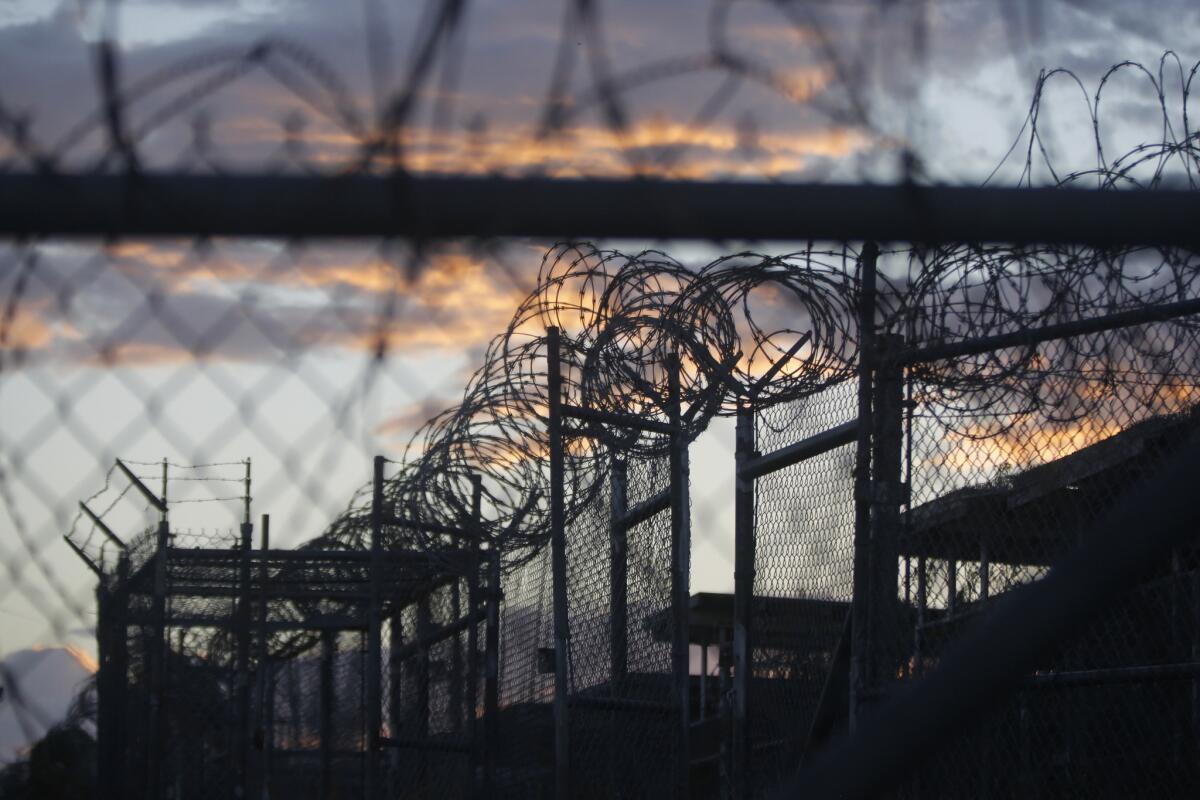Bin Laden bodyguard: Worthy of release or still a terror threat?

ARLINGTON, Va. — Dressed in a white T-shirt, the former bodyguard of Osama bin Laden sat at the center of a long table Tuesday in the Guantanamo Bay prison, his beard dark and long, listening to two sides argue his fate.
On one side, his attorney David H. Remes told a review board that Abdel Malik Ahmed Abdel Wahab Rahabi was a model prisoner who helped end a hunger strike last year, was elected “block leader” by fellow detainees and worked with camp authorities to ease the tensions in the prison.
He has taken English, art and business lessons, and drawn up plans for an agricultural enterprise called “Yemen Milk and Honey Farms Limited.” His family submitted videos and other material supporting his return home, noting that his teenage daughter was still a toddler when he was captured in Pakistan after fighting U.S. troops in the Tora Bora Mountains.
“Ayesha is a beautiful girl of 13,” Remes told the panel, which is considering whether to remove Rahabi’s classification as “enemy combatant” to make him eligible for release. “Mr. Rahabi has not seen her since she was an infant. His face lights up at the mention of her name.”
But government officials, also appearing at the first semi-public Periodic Review Board hearing that will eventually be held for some 70 similar terror prisoners, described the 33-year-old former vegetable seller from Yemen as a dangerous jihadist who abandoned his family to join Al Qaeda. In addition to his ties to Bin Laden, they said, he had planned to hijack and crash an airplane into a U.S. military facility in Asia on Sept. 11, but the plot was canceled in favor of the attacks in New York and Washington. If released, they warned, Rahabi might find “ample opportunities” to fight again.
Since his capture in late 2001 and his January 2002 transfer to Guantanamo Bay, the prisoner also known as YM-037 “has provided little information of intelligence value” to U.S. interrogators.
But the government suspects he once was “closely associated with extremists who are now active in Yemen,” including the Al Qaeda network in the Arabian Peninsula (AQAP). They said his brother-in-law is a prominent extremist in Ibb, the family’s hometown in Yemen.
The government warned: “The marginal security environment in Ibb probably would give YM-037 ample opportunities to join AQAP if he decided to re-engage” in terrorism.
Rahabi, a man of a half-dozen aliases, showed no anger toward his captors Tuesday and expressed no disdain for the U.S. during the public part of the proceeding. Rather, he seemed polite and patient, sitting quietly with his hands folded on his lap.
The 20-minute opening session was held in a conference room trailer at the prison, and broadcast through a closed-circuit feed to a small group of reporters and human rights advocates on the ninth floor of a Pentagon annex in Arlington.
The panel — composed of members from the Defense and State departments, the Joint Chiefs of Staff and the U.S. intelligence community — reconvened in closed session to discuss classified material and to hear from Rahabi himself, whose testimony was not shown. The panel will weigh his current threat assessment and help decide whether he still poses a significant danger.
A decision is likely weeks away. The review hearings are part of an Obama administration program to help reduce the number of Guantanamo detainees in preparation for eventually closing the facility.
ALSO:
Police shoot teen after knife scuffle at Hawaii high school
Charlotte cop indicted in shooting of ex-Florida A&M football player
Snow rollers: Rare, strange phenomena eerily made by winter freeze
More to Read
Sign up for Essential California
The most important California stories and recommendations in your inbox every morning.
You may occasionally receive promotional content from the Los Angeles Times.










